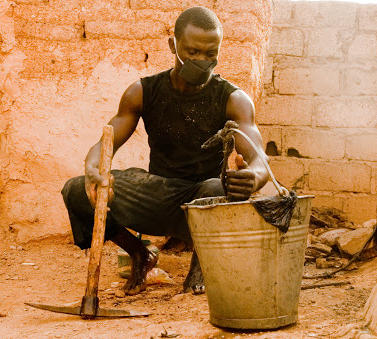
Humanitarian & Development
Location
Ouagadougou, Burkina Faso
Sponsor
Patrice Fonlladosa
Grant
€20,000 for the Committee on 13/10/2016
Project Leader
Ever since it was founded in 2008, Assoprojection has brought together young professionals who were concerned about the issue of access to basic services in developing cities. Its 750 members hail from all sectors (government administration, private-sector businesses, charities, university and research institutions etc.) and all professions (engineers, geographers, sociologists, economists, managers, political scientists, communication specialists etc.). Based in Nanterre near Paris, it opened a branch in Ouagadougou in 2011.
Intent on encouraging the emergence of original ideas from young professionals, Assoprojection is working on a project in Ouagadougou. The association has noticed that sanitation is still the poor relation in terms of basic services, and that septic tank manual cleaning is especially neglected. The network ran an initial sanitation skills improvement scheme in 2010 in Niger (“Sani Tsapta – Sanitation know-how”) which demonstrated how interested the populations were in the topic.
In Ouagadougou, where the association has established a branch, few households are connected to the urban sewers. The zone covered by the sewer network is mostly the city’s shopping centre. The rest of the city relies on individual sanitation, which mainly includes latrines and septic tanks. When those are full, there are two methods to empty them: mechanical cleaning and manual cleaning.
The working conditions of septic tank manual workers in Ouagadougou are difficult and hazardous to their physical safety and their health. Most of them are not adequately trained, they work with no protective equipment, bare feet and bare hands in the tanks, using just spades and buckets to handle the sludge, which is sometimes still fresh.
« “I fully support this project that makes great sense and which is part of Group operations seeking to act on its direct environment.” » Patrice Fonlladosa
Usually, septic tank manual cleaners prefer working at night in order not to be seen, but also so they can take advantage of the darkness to empty the contents of latrines either in the street, in the gutters, or even in the plot itself. It is also a way of avoiding the authorities who fine them on a regular basis for “unlawful dumping”, but without providing any kind of alternative. As a result of the lack of appropriate infrastructures nearby, the sludge which is dumped in nature will pollute the environment and lead to the proliferation of diseases like diarrhoea, the third cause of mortality of children under five in Burkina Faso[1].
Septic tank cleaners are also marginalised and suffer a lack of any formal institutional and legal framework.
So the Vimapro project aims to boost the septic tank manual cleaning sector by giving the profession a better structure and more recognition from the authorities, making it more decent, hygienic and economically viable, thereby improving the cleaners’ working conditions and helping them to develop their business throughout the Burkinabe capital.
The project’s initial phase involves making a detailed diagnosis of the various kinds of sanitation services, reviewing experiences across the world in septic tank manual cleaning, and setting up a listing of septic tank manual cleaners.
The association also intends to provide the cleaners with better training and equipment (overalls, boots, gloves, hard hats, spades and pickaxes, chisels, scrubbing brushes, scrapers and buckets). The project also calls for motorised tricycles and storage vats so that no dumping is made directly in the neighbourhood but in areas provided for the purpose. Lastly, the cleaners will be offered to be vaccinated against typhoid fever, yellow fever, tetanus and hepatitis B so as to reduce the risk of diseases relating to their work.
“100 projects for the climate”
Vimapro, among 100 other projects, won the “100 projects for the climate” competition, driven by France’s Ministry of the Environment, Energy and Maritime Affairs. Launched as part of the COP21, the contest aimed at providing guidance to private civic initiatives against global warming and to protect the environment. Accordingly, Vimapro received guidance and enhancement right up to the COP22 in November 2016.
Meanwhile, Assoprojection is intent on campaigning before the authorities to establish a formal recognition of the profession of septic tank manual cleaner, organise them into an association, and facilitate access to dumping sites. Assoprojection is also working at raising awareness among households and the pupils of 20 Ouagalais schools in order to improve the perception and sanitation practises of the population. Several meetings are planned with headmasters or their representatives. The septic tank cleaners will perform their work free of charge in those schools, by getting the children to participate in the cleaning process.
This approach has ambitions further afield, so it can go beyond just the working conditions of manual cleaners in the capital, and actually reinforce sanitation throughout Burkina Faso for the long term.

